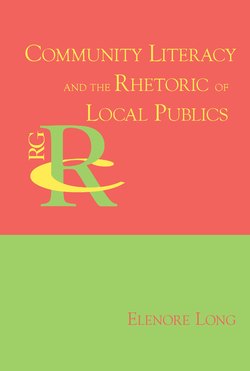Читать книгу Community Literacy and the Rhetoric of Local Publics - Elenore Long - Страница 10
На сайте Литреса книга снята с продажи.
ОглавлениеAcknowledgments
My heartfelt thanks to Wayne Peck, Joyce Baskins, and everyone at the Community House Church. My greatest joys in life include the projects we have carried out together. I am also indebted to the scholars whose work informs community-literacy studies. Their care as researchers and their commitments as people have made my task inspiring and pleasurable. Linda and Tim Flower have been steadfast friends of this project—one could ask for no better collaborative planning partners. Linda, thank you for your patience, insight, and encouragement across enumerable drafts.
Maureen Daly Goggin prompted patiently as I shaped the third chapter that locates community-literacy studies in the larger disciplinary history. Lorraine Higgins rekindled my interest in communicative democracy and offered helpful comments on chapter 5, especially regarding implications that follow when work disappears from urban areas. I am grateful to my entire circle of friends—including Patti Wojahn, Loel Kim, David Fleming, Kirk Branch, and Amanda Young—who contributed all varieties of support and inspiration.
Several professional forums have nourished this project and made a place for it in the discipline. I am grateful to those whose vision and attention to detail have allowed for such fruitful discussion: Frans H. van Eemeren and colleagues sponsored the Fifth Conference of the International Society for the Study of Argumentation where I mapped out the initial grid for this book; Glynda Hull and Kathy Schultz organized the 2004 NCTE assembly for research where colleagues from the Community House in Pittsburgh and I cast digital storytelling as local public practice; Peter Goggin and Maureen Mathison sponsored the annual Western States Rhetoric and Literacy Conference where I tested early and the most recent incantations of a local public rhetoric; Charles Bazerman and Sue McLeod made possible CCCCs sessions dedicated to this and related work. With support from Reflections: A Journal of Writing, Community Literacy, and Service-Learning and the Community Literacy Journal, Eli Goldblatt, Steve Parks, and David Jolliffe organized a symposium in Philadelphia to imagine the future of community-literacy studies.
In all my enthusiasm, my initial version of this project was far too long. You are in for a better read, thanks to Charles Bazerman and his vision for the Reference Guides to Rhetoric and Composition. David Blakesley and Michael Palmquist patiently provided guidance all along the way. Judy Holiday, Sundy Watanabe, Jeffery Grabill and his students in AI 877: Community Literacies put drafts of this manuscript to various uses; their interest and feedback have strengthened this text and fortified my spirit in numerous ways. I am grateful, as well, to Tracy Clark, who copyedited the manuscript.
The administration and my colleagues at Bay Path College provided time and resources to support this project. I am especially indebted to the College’s provost, William Sipple; the reference librarian, Sandra Cahillane; student assistants, Andrea English and Stephanie Zeiser; and my dear friend and colleague, Brenda Hardin Abbott.
New colleagues at Eastern Washington University helped me to make time to complete this project while learning a new culture and assuming new professional responsibilities. I am particularly indebted to Logan Greene and Garrett Kenney.
My extended family has sustained me with their companionship, laughter, food, and great stories. John and Hannah Jarvis have adjusted their own lives to make room for this project and celebrated each little step toward its completion. Best of all, now—they say—the time has come to pack it up. Thank you.
